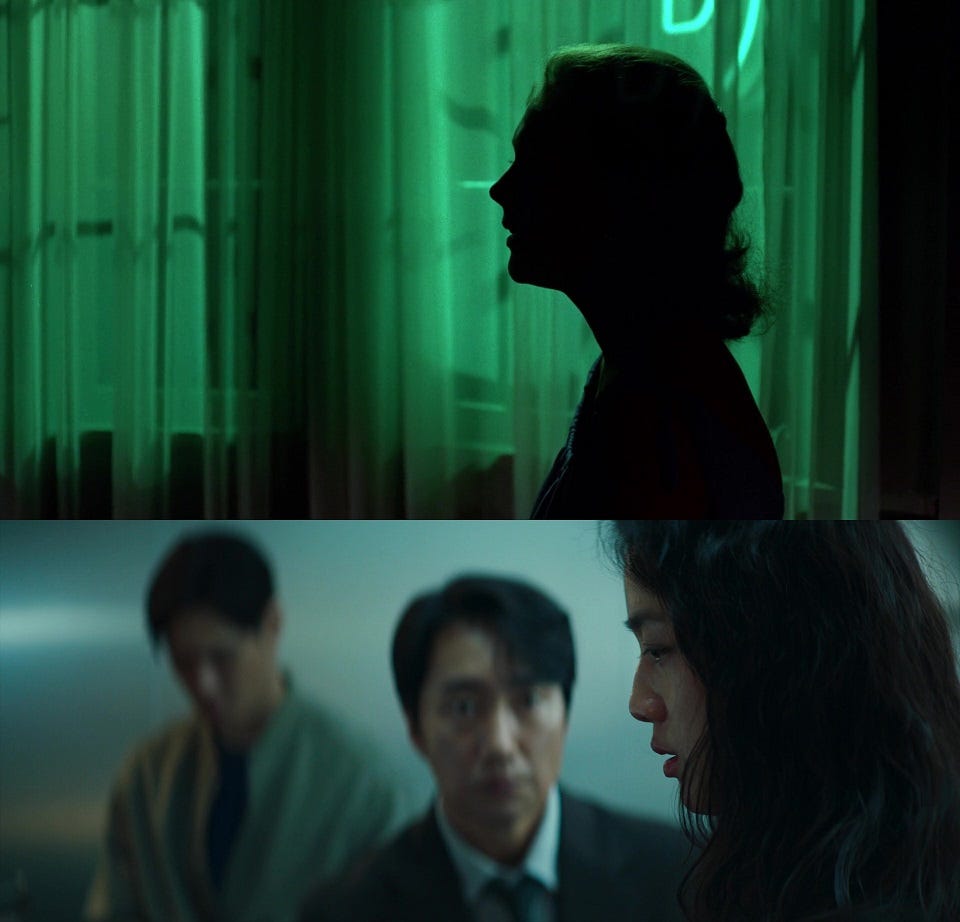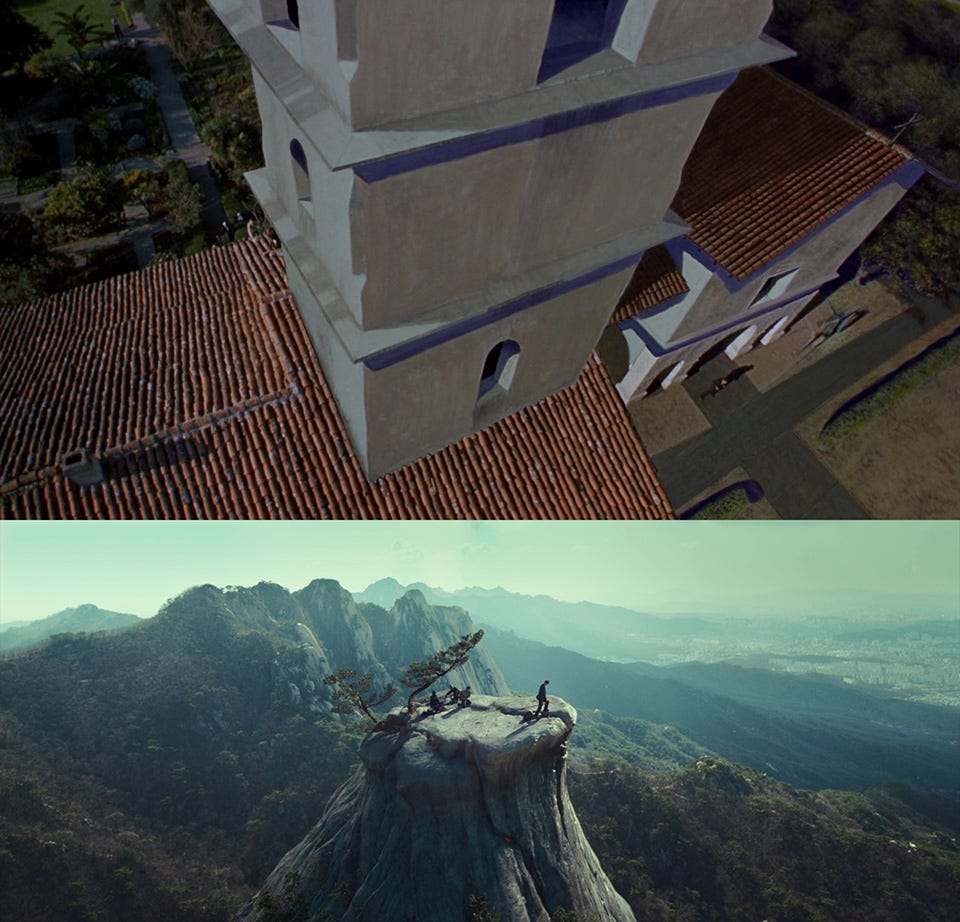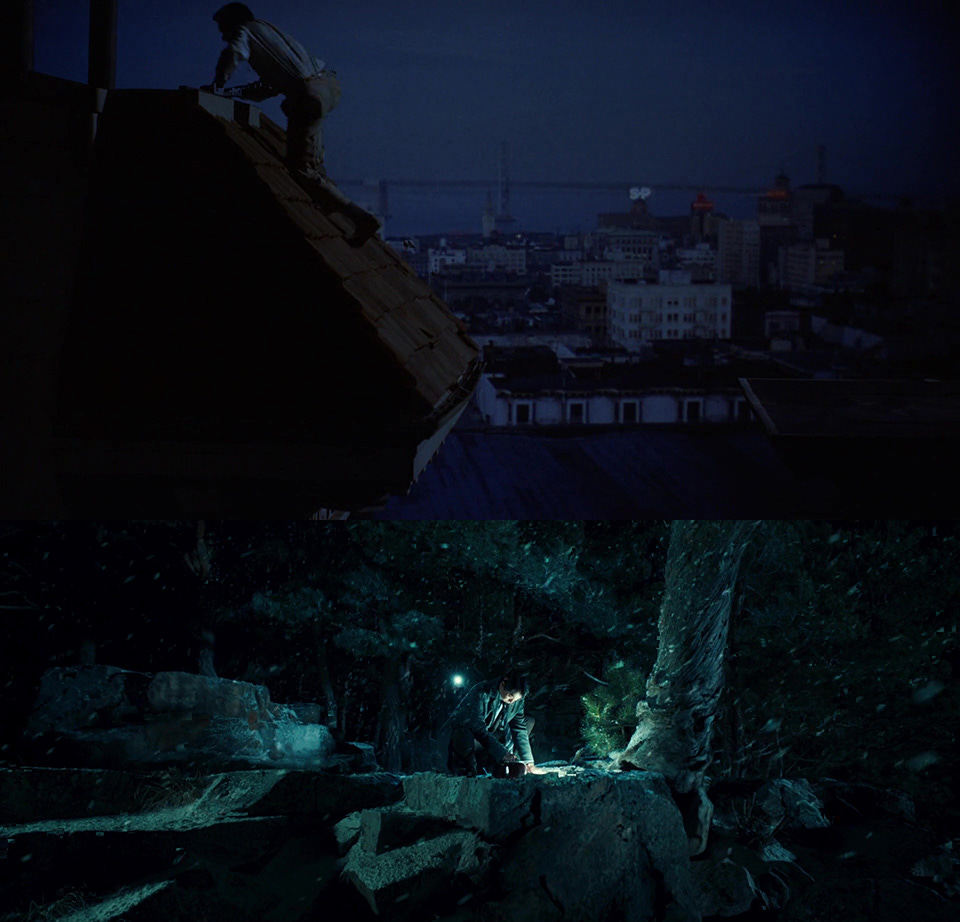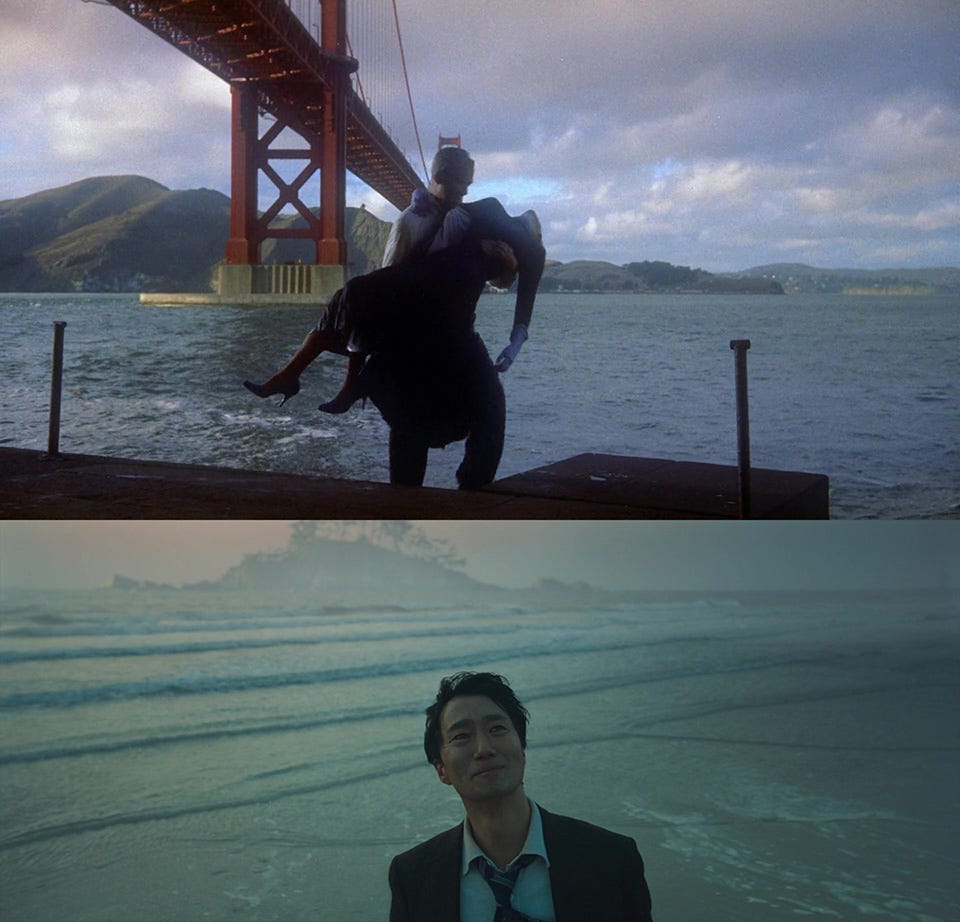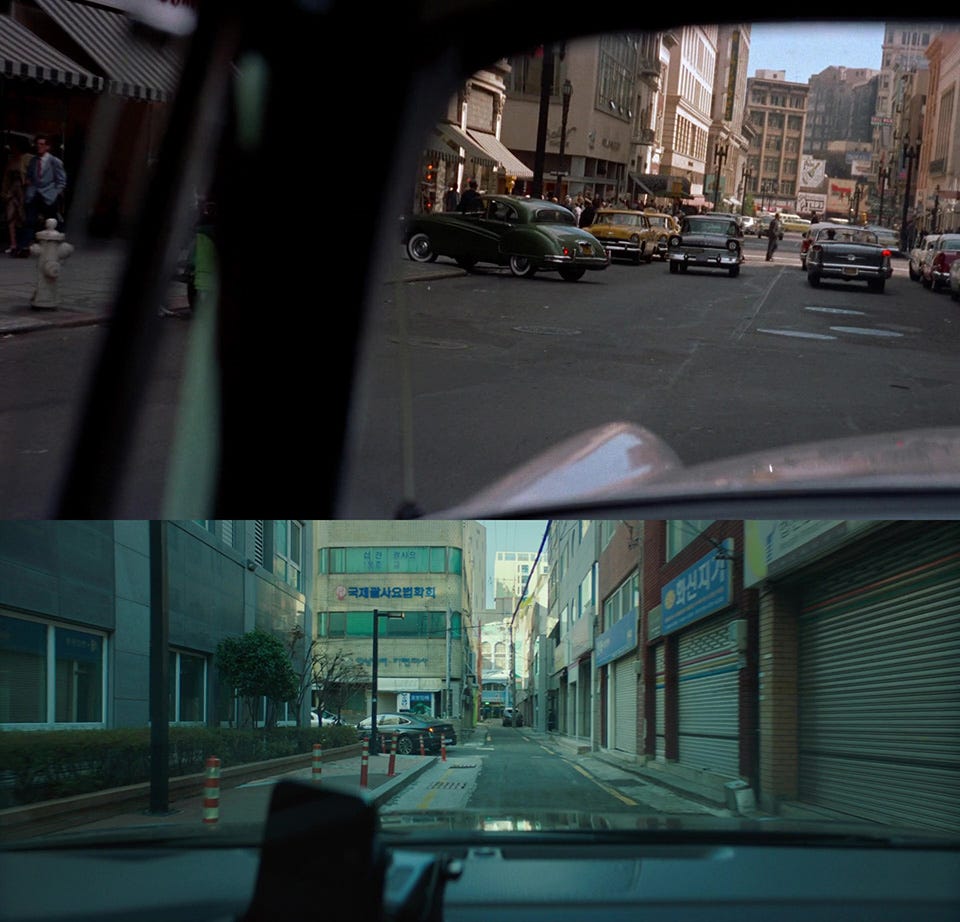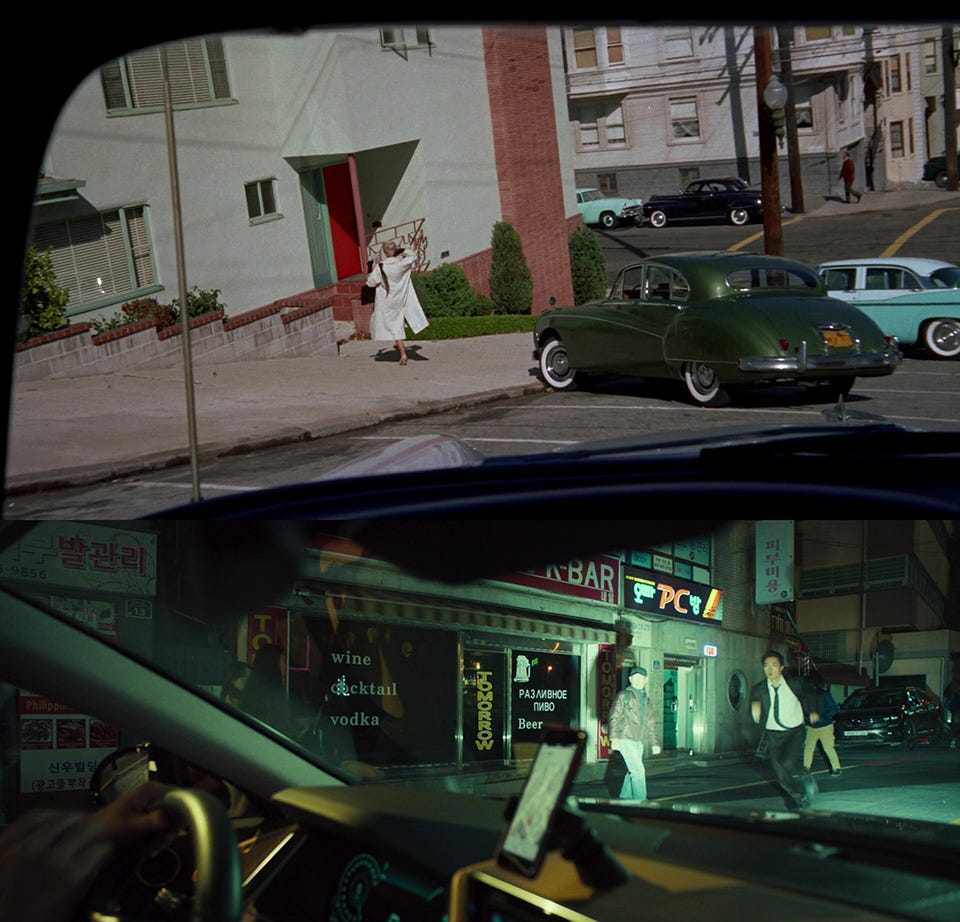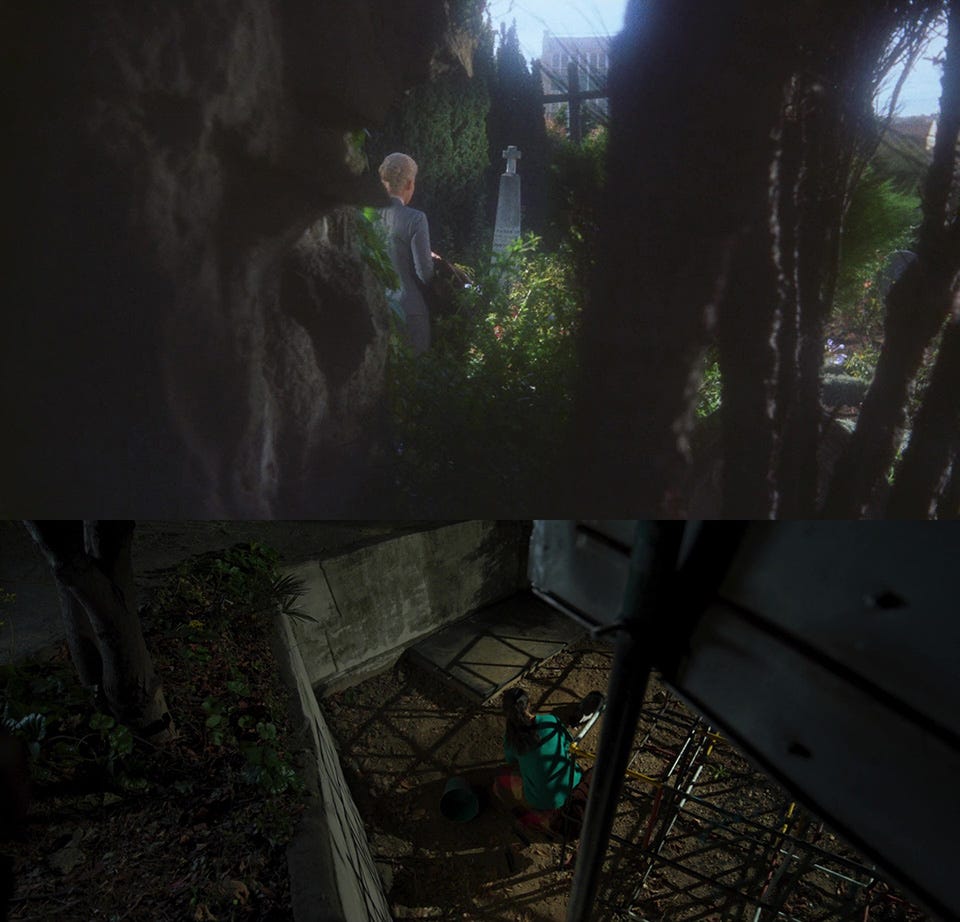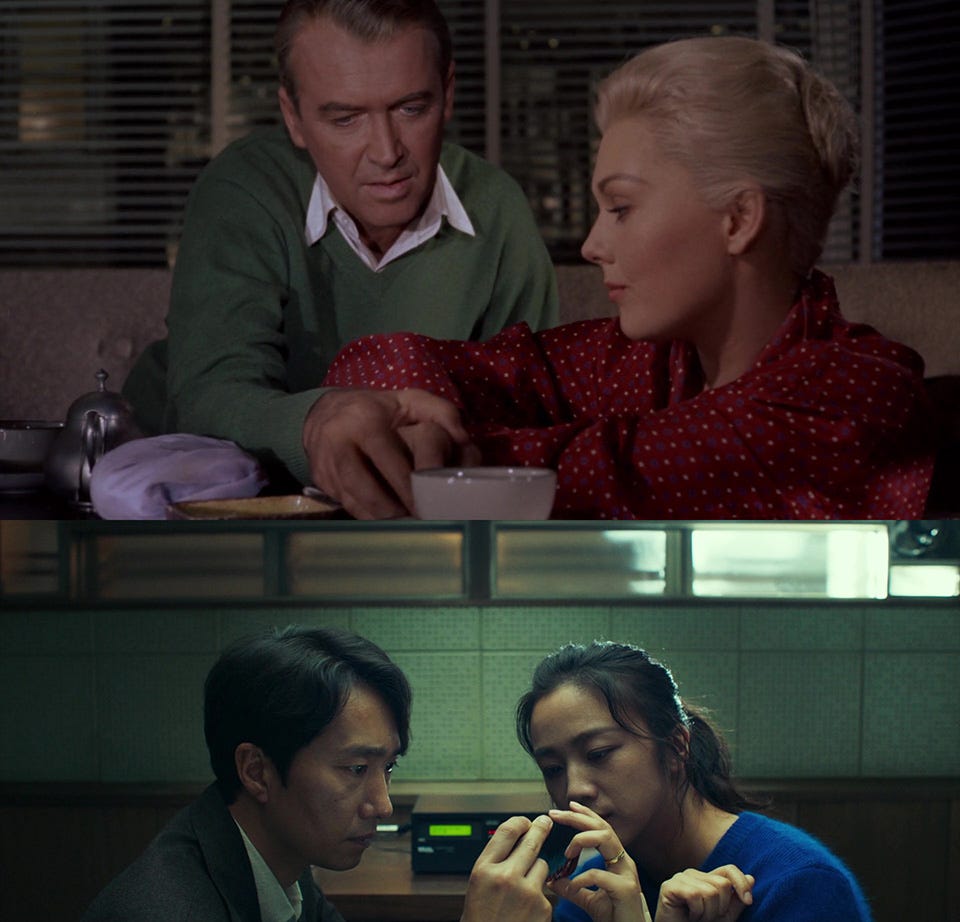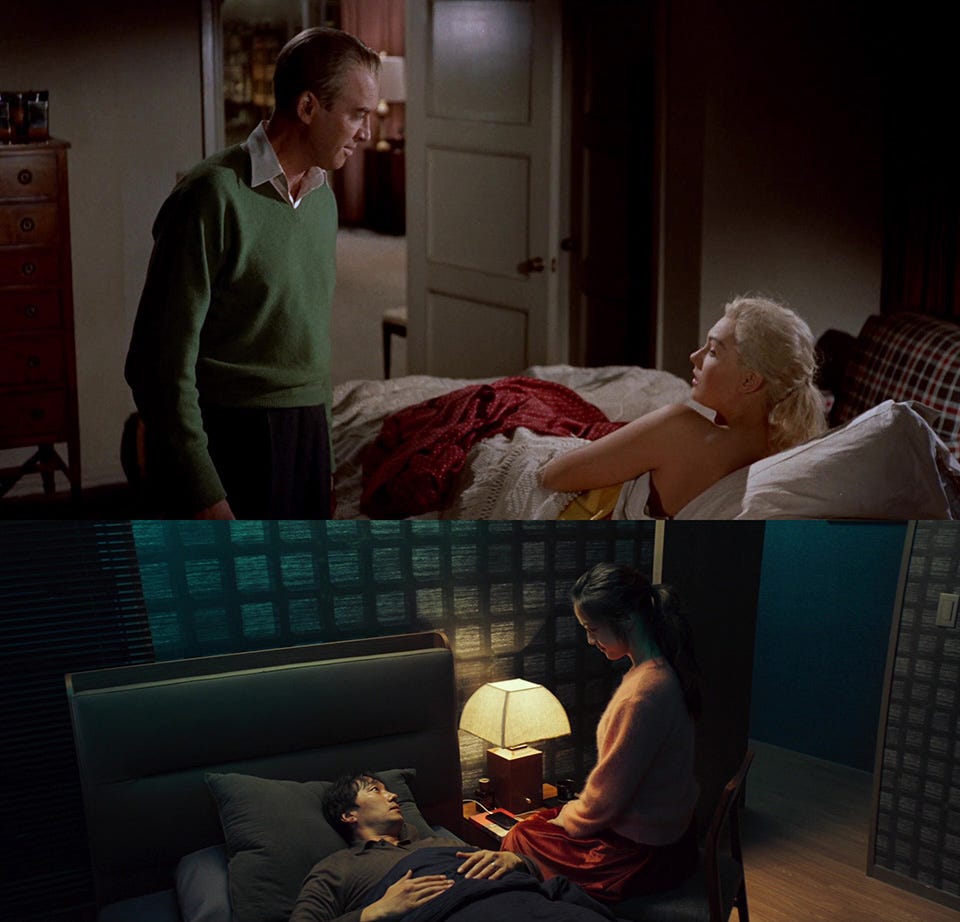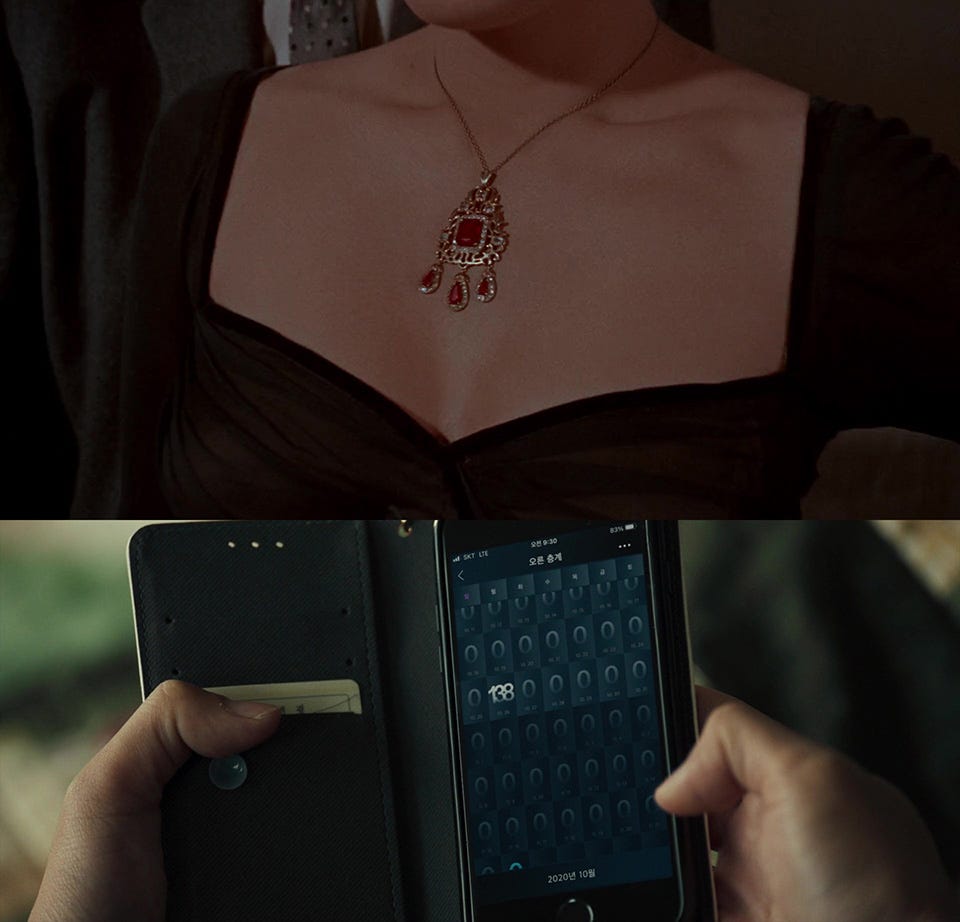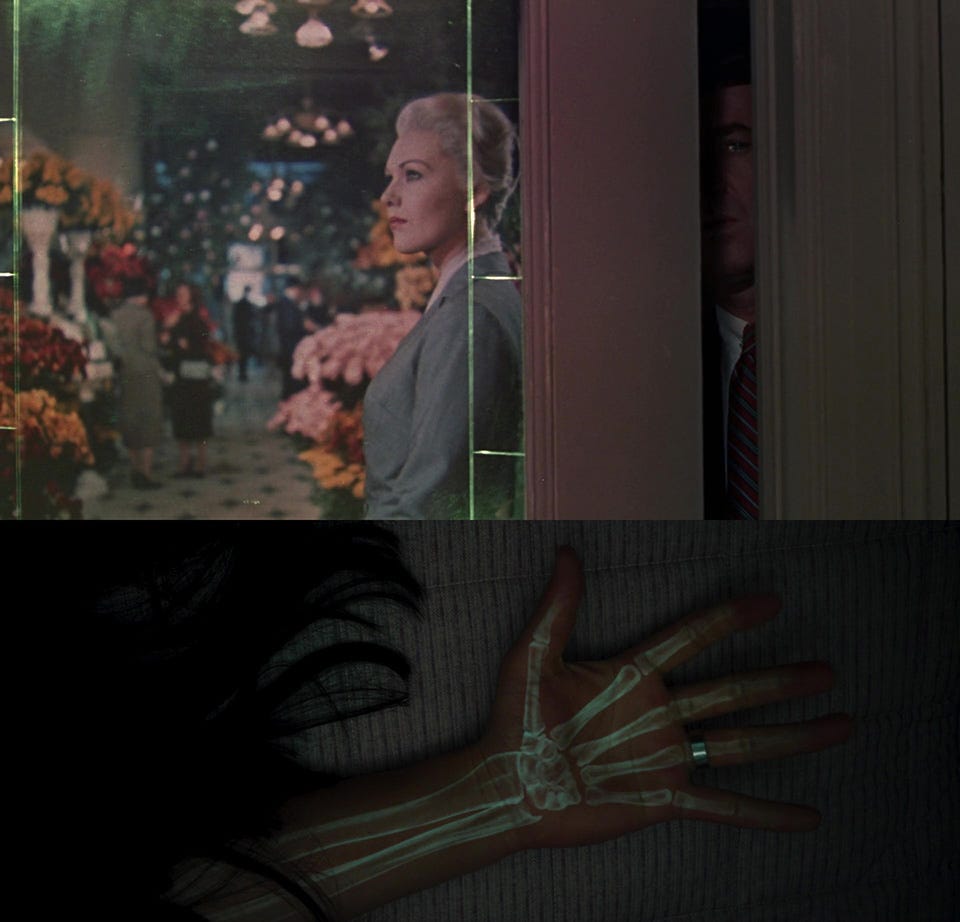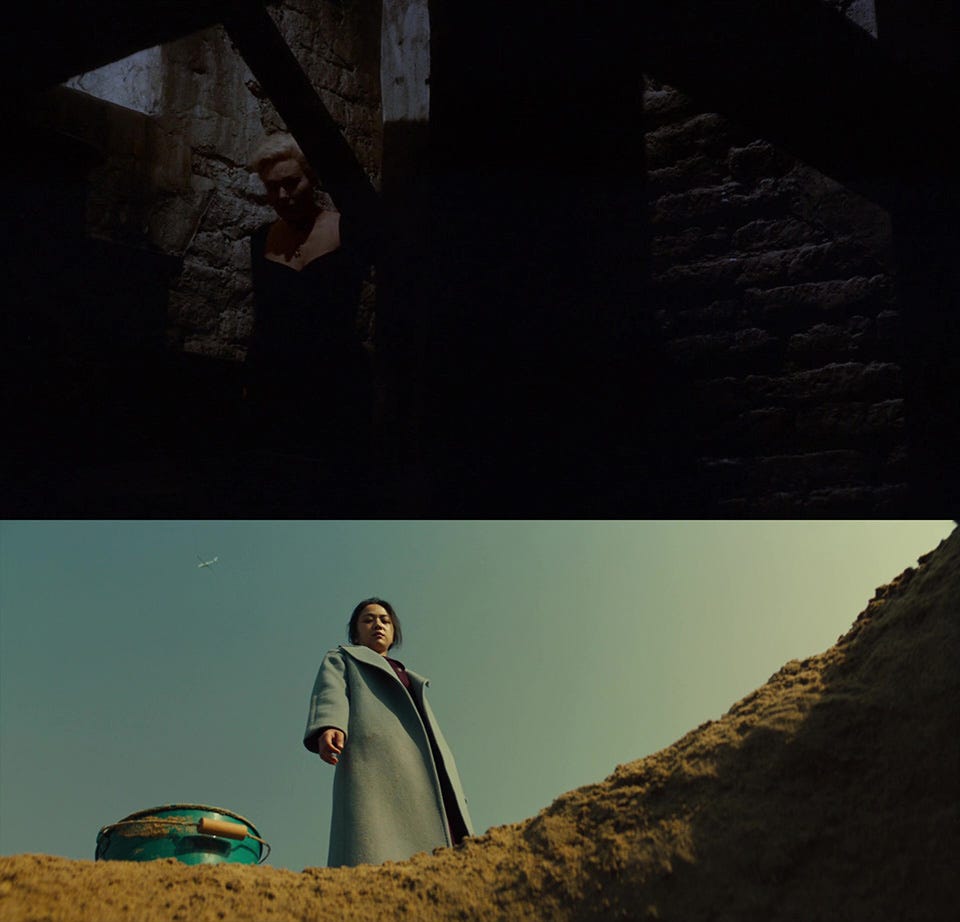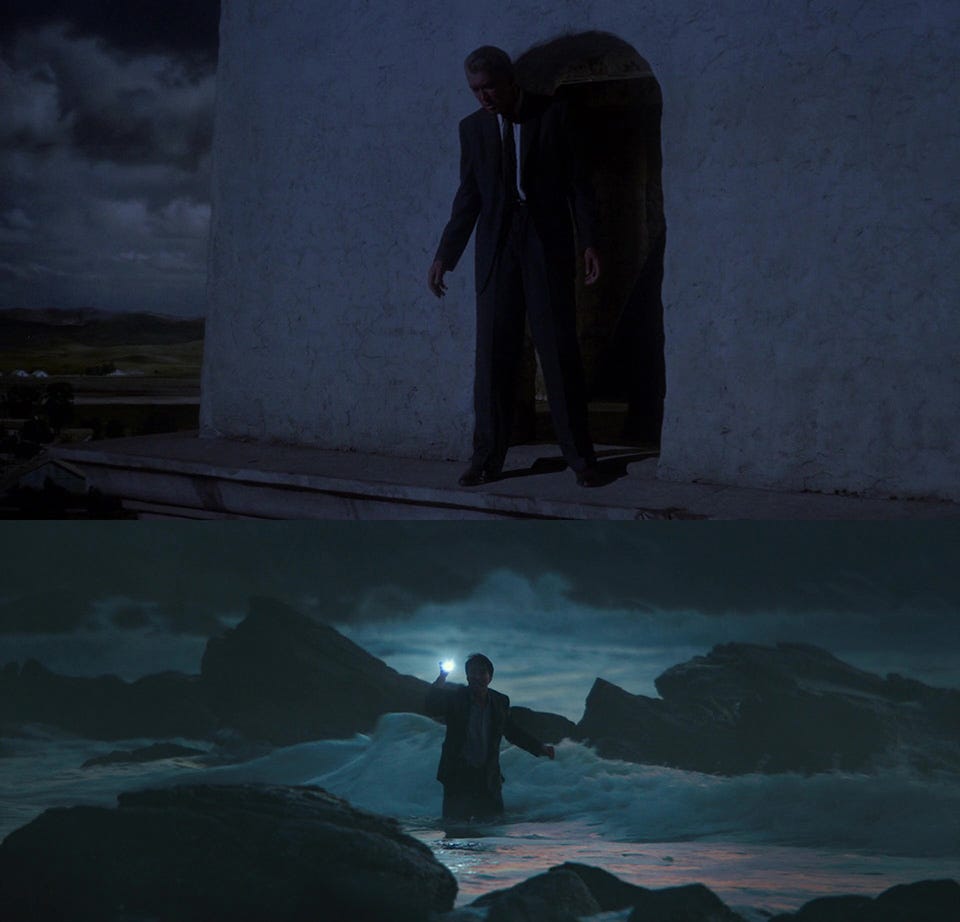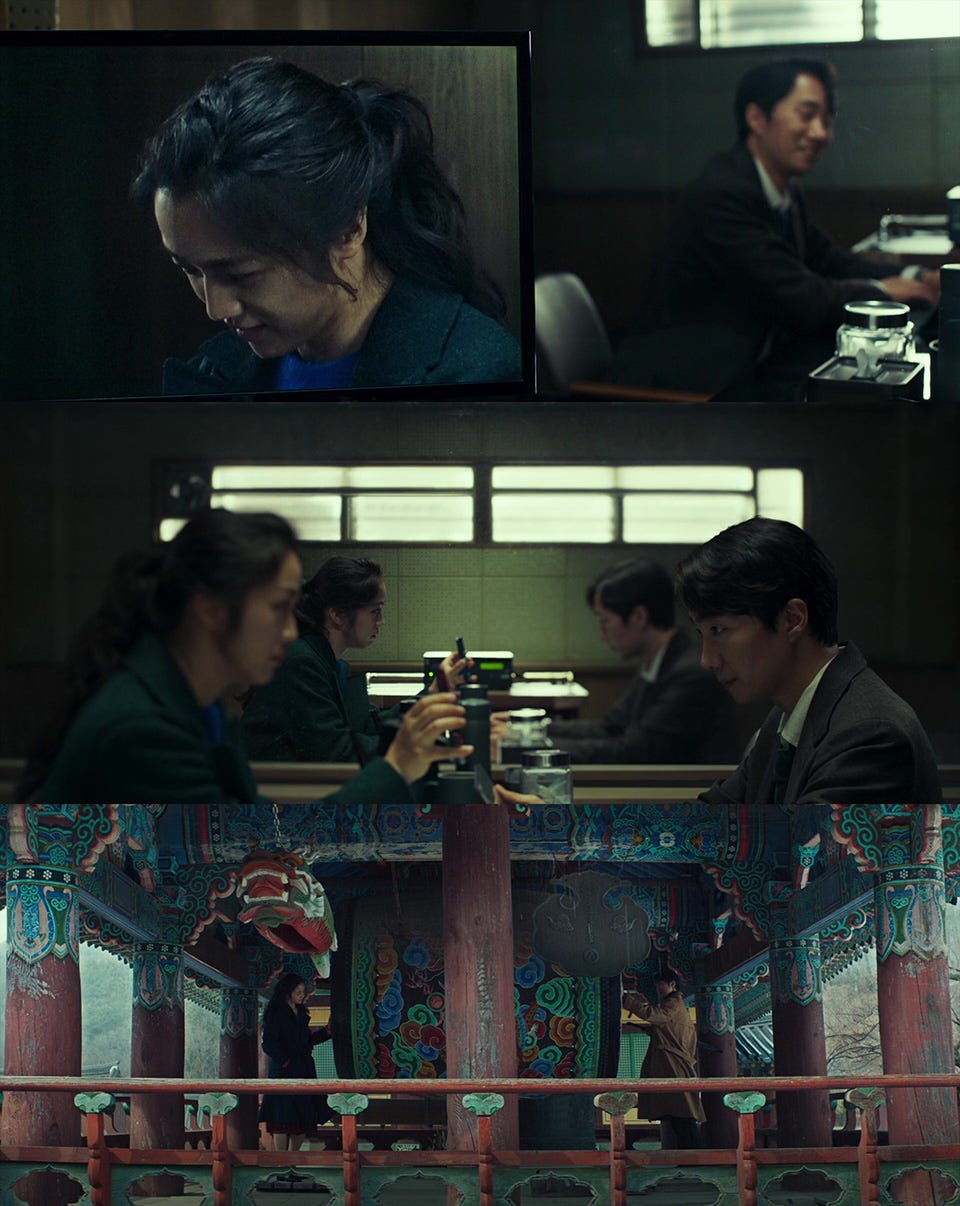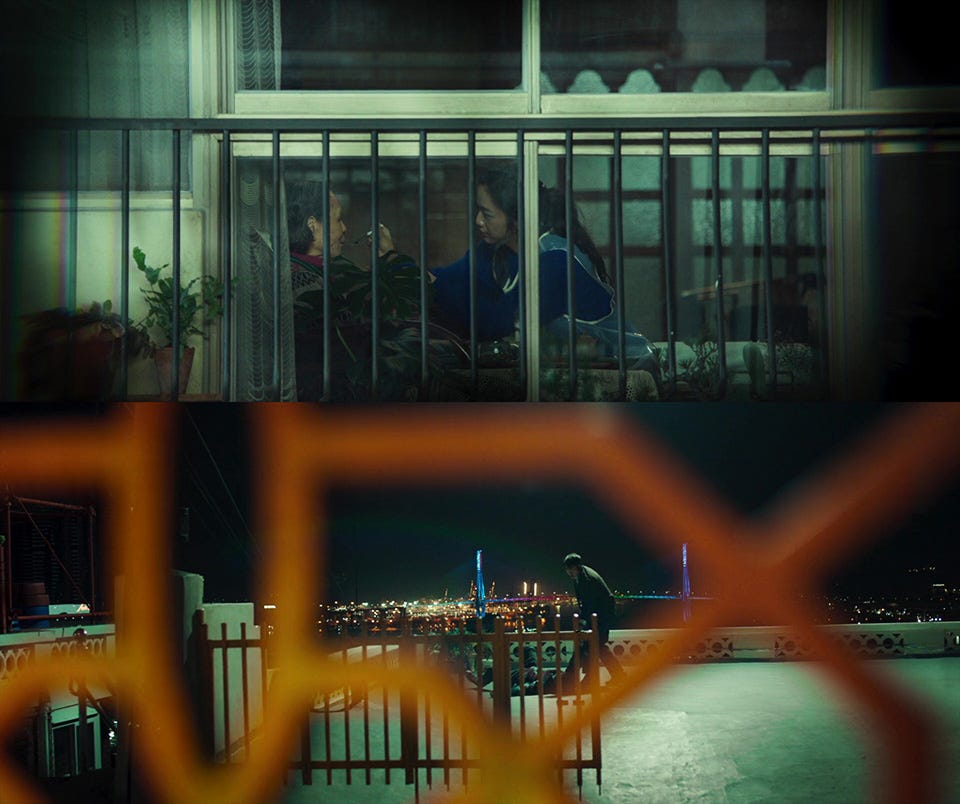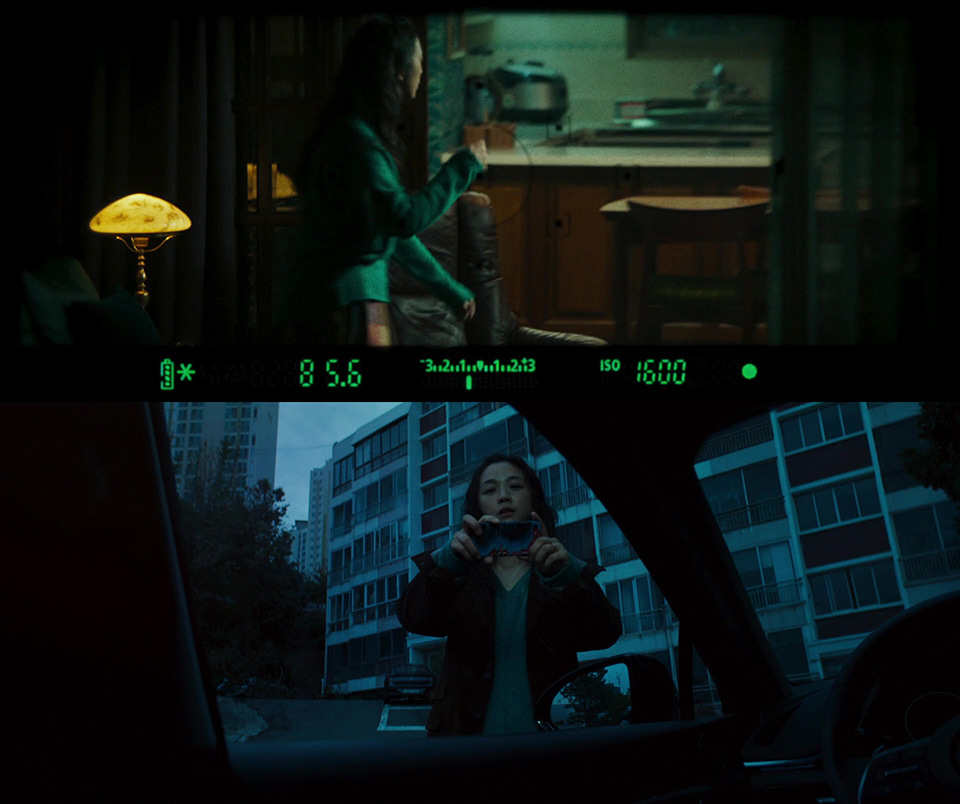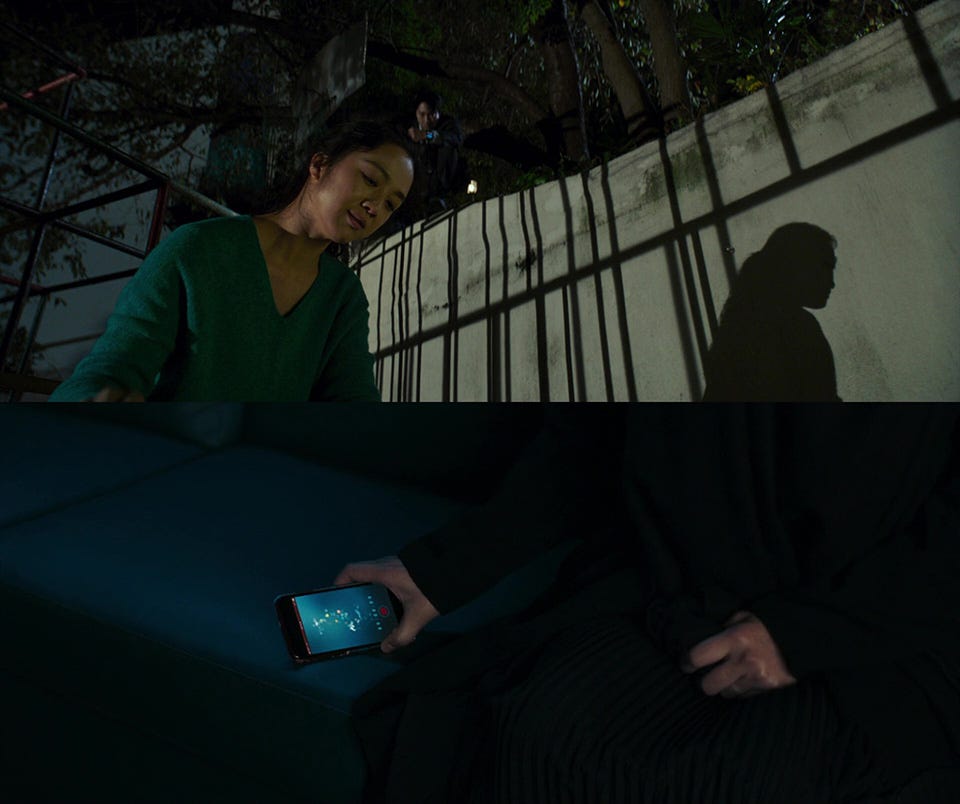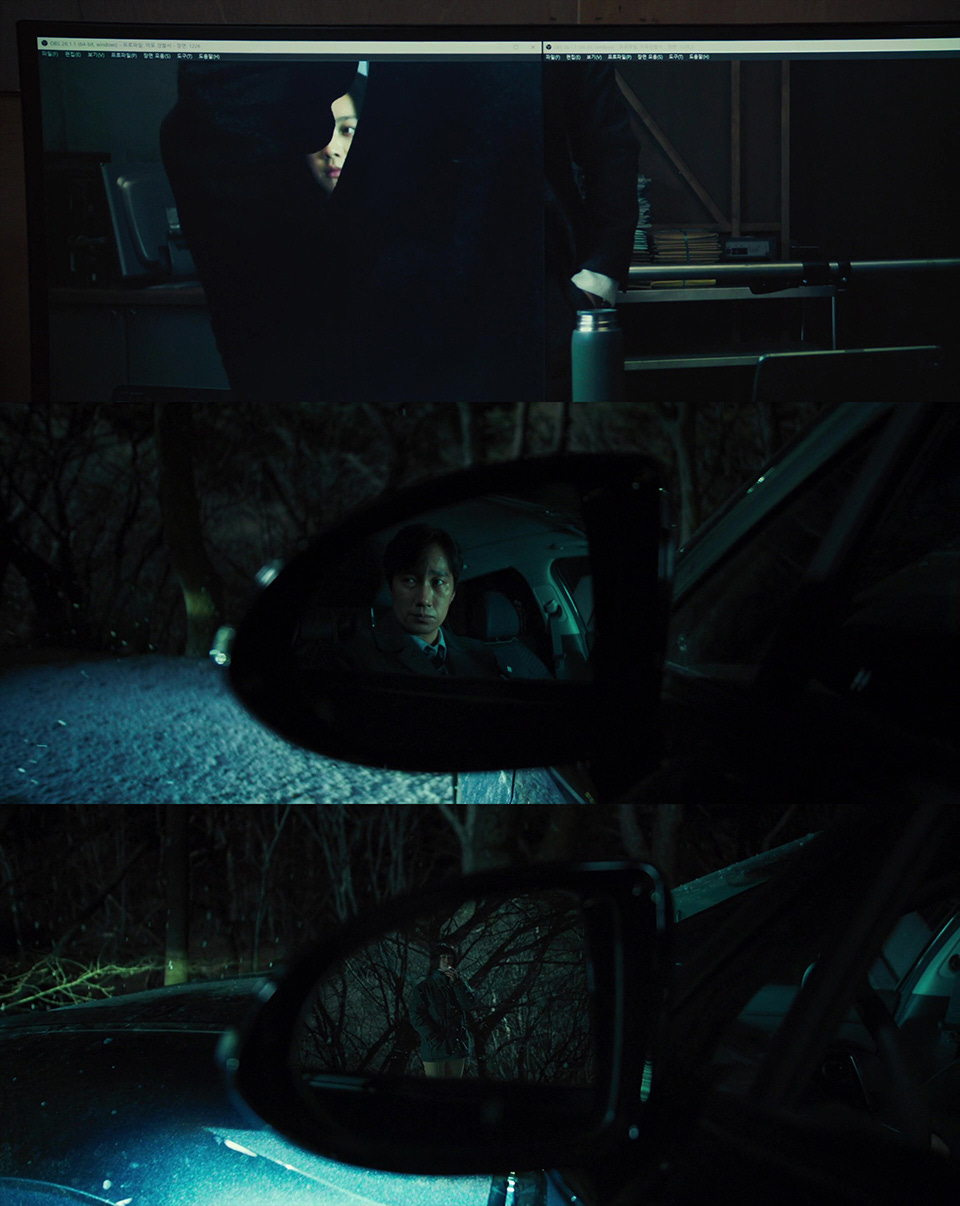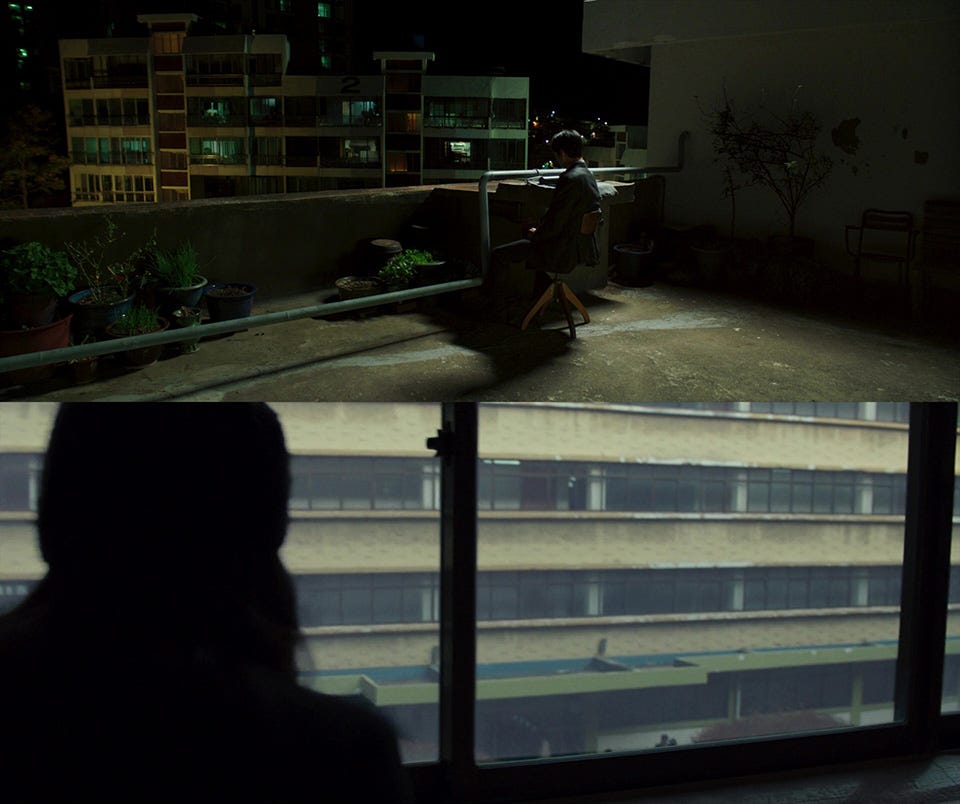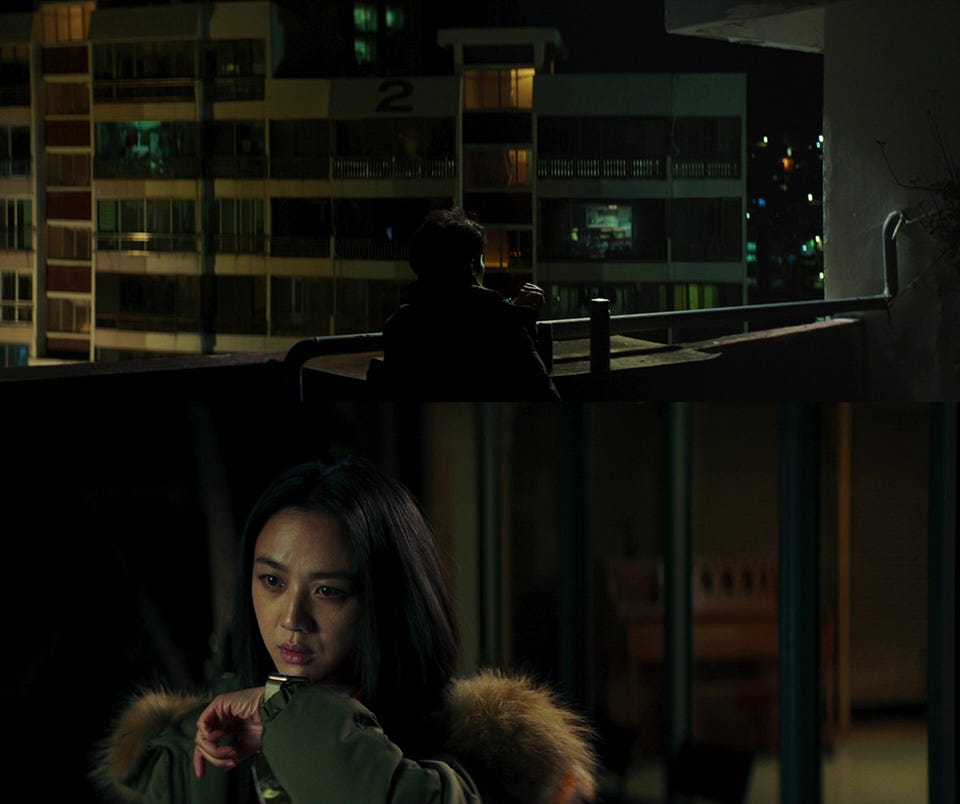Vertigo (1958) & Decision to Leave (2022)
An analysis of the similarities, differences, and strengths of the two films.
When I first watched Decision to Leave, I recognized plot and thematic similarities to Vertigo, but it wasn't until rewatching them together that the sheer number of connections in theme, plot elements, narrative structure, and shot composition - plus Park's clever updates to Hitchcock's story - really came to light.
Full spoilers for both films ahead.
A brief comparative summary of each film:
Vertigo - A cop (who suffers from vertigo) is tricked into believing a wife's murder is a suicide by the husband and a woman playing the part of the wife - while simultaneously falling in love with the fake wife. Afterwards, the cop suffers a mental breakdown and the story jumps forward about a year to when the cop runs into a woman who looks very similar to the (fake) dead wife (but who is actually the same woman). It seems history is repeating itself and he embarks on a manic makeover so she'll look exactly like the (fake) wife did when she (fake) died. Eventually he spots a single clue and realizes he's been tricked, so he takes her back to the murder site for a confession and she's accidentally killed.
Decision to Leave - A cop is tricked into believing a husband's murder is a suicide by the wife (who suffers from fear of heights) - while simultaneously falling in love with the wife. Eventually he spots a single clue and realizes he's been tricked, so he confronts her for a confession and then exits her life (while leaving the incriminating evidence with her). Afterwards, the cop suffers a severe depression and the story jumps forward about a year to when the cop runs into the same woman again but with a new husband (who is murdered almost immediately). It seems history is repeating itself and he embarks on a manic investigation so she'll be prosecuted exactly like she should have been for the first crime. Eventually he realizes that she's actually been protecting him, but by then she has killed herself.
Aside from the obvious parallels in the summaries above, Park has also used several of the same plot elements.
Both films have two important locations that are very high:
Mission bell tower/Mountain where husband dies:
Rooftops of San Francisco/Homi Mountain:
Both films have one important location at the sea:
Both films have a 3-man chase scene (1 criminal/2 cops):
Surveillance is a huge part of both films. In Vertigo, it's always the detective; in Decision to Leave, it's both the detective and the wife (more on that later):
Tailing another car:
Surveilling from inside the car:
Watching the surveillant inside the car:
Surveilling from behind at a gravesite (Carlotta/black crow):
Some shots/scenes feel like homages to Vertigo (intentionally or not):
The first death in each movie:
The first touching of hands:
Each film has one scene with one of the couple in bed:
Bodies and blood:
Some shots/scenes feel very similar in tone (intentionally or not):
The discovery of the clue:
Each film uses ingenious compositing to convey the growing obsession:
The women protagonists ~5 minutes before the end of each film:
The final shot of each film:
Digging more deeply into both films, I think Vertigo is an important and influential film for the following reasons:
The fact that such a strange, dark film (with an incredibly bleak ending) was made by such a popular, commercial director in the '50s.
It has the all-American Boy Scout, Jimmy Stewart, turn from the hero into the obsessive (virtual) villain in the second half of the film.
It mirrors one of Hitchcock's own compulsions so well (i.e. his continual recreation of the “icy blonde").
Hitchcock's excellent use of color (easily his most experimental color film).
Bernard Hermann's amazing and iconic score.
Saul Bass' great title sequence for the film, which along with Hermann's score really sets the mood/tone of the film.
But I also think it’s weak in two important ways. While I agree with some people that the murder plot is more convoluted (and failure-prone) than it needs to be, that isn't as much of a stumbling block for me as the following:
While Scottie's (Stewart’s) growing obsession for Madeline (Novak) feels real, Madeline falling madly in love with Scottie in just one afternoon falls totally flat. It's important to remember that during all of her interactions with Scottie pre-murder, she's playing a role (she's putting on a fake accent, manner, etc). When she falls into the bay and allows Scottie to take her back to his apartment and completely (and rather creepily) undress her and put her in his bed, she's faking unconsciousness. The idea that, while acting a part in a murder scheme, she almost instantaneously falls for the obsessive 25-year-older detective that is stalking her just doesn't feel plausible. It's hard to know for sure whether this is simply due to the limitations of Novak's acting or at least partially due to the adaptation.
Also, Madeline/Judy has no agency in the film (aside from her single choice of not fleeing SF post-murder/meeting Scottie). She's controlled through the entire film by men; either Gavin Elster (the husband) or Scottie. This would be an interesting theme to explore, but there's no indication that Hitchcock had any interest in this - his focus was totally on the obsession of the man (which is another reason the Madeline-falling-for-Scottie plot point feels rushed and unconvincing).
So as a portrait of a man obsessed, Vertigo has real power, but the implausible reactions of the woman makes the narrative as a whole (as visually striking as it is) fall apart on reflection. As a story about obsession and doomed love, Decision to Leave avoids Vertigo‘s problem by giving motivation and agency to both characters (the detective Hae-joon and the wife Seo-rae).
The narrative does this within contrasting motifs, such as "mirrored" versus "shattered":
In the first half of the film, there is a mirroring in shot composition and behavior (like the matching of their breathing):
After Hae-joon surveils Seo-rae, she surveils him:
After Hae-joon photographs Seo-rae, she photographs him:
After Hae-joon records Seo-rae, she records him:
In the second half of the film (after the “shattering”), the mirroring is disrupted, both in shot composition and behavior (until later):
As Hae-joon used to do in the first half of the film, Seo-rae now surveils him:
As Hae-joon used to do in the first half of the film, Seo-rae now makes voice memos about him:
The stealth power of the film (and one of the reasons it really rewards a rewatch) is that it subverts the femme fatale trope in a way I don't recall before (i.e. she falls in love and begins helping the detective), but the idea of the femme fatale is so ingrained in our popular culture and psyches that both we and Hae-joon continually expect Seo-rae to have ulterior motives or betray him as the film progresses, so the fact that she becomes, in essence, the heroine is easy to miss on a first viewing.
How one feels about euthanasia for seriously ill people that want to die or women killing their violent abusers would likely affect one's ability to ever see her as a "heroine", but the fact remains that after attempting to conceal the murder of her terrible husband by forging letters that exposed the bribes he took as an immigration officer, all of her subsequent behavior was to help Hae-joon - either in his work, life, or to avoid punishment for helping her.
She solves the Beom case for him (reads the file and predicts where San-o can be found).
She helps him have his first stretch of good sleep in ages.
She expedites Slappy's murder of her husband to protect Hae-joon from losing his job/being charged with accessory to murder.
She gives him back the original evidence (phone) to allow him to properly solve her husband's murder ("Re-investigate with this. Go back to before you were shattered.")
She kills herself so he won't be conflicted about arresting her or letting her escape punishment again.
Her only acts of "selfishness", from about 40 minutes into the film until the end, were to move to Ipo for the chance of seeing him again and to hide her body ("Some place deep... where no one can find it.") so that she can continue to live in photos up on his wall of unclosed cases. But, as mentioned above, her love can be hard to see for Hae-joon (and the viewer) without reflection (or rewatch).
In conclusion, Vertigo is the more important film (historically), but Decision to Leave is ultimately the more believable, complex and satisfying film for me. I also think the performances by Tang Wei and Park Hae il (called the South Korean "Jimmy Stewart" by Park Chan-wook) surpass Jimmy Stewart and Kim Novak.





